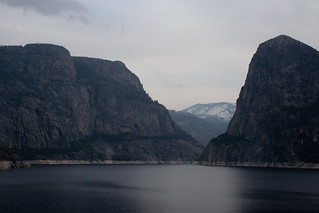 Package calls for more conservation, less storage
Package calls for more conservation, less storage
by Brian Leubitz
For better or worse, Jerry Brown’s water bond from yesterday is still the leading candidate to replace what is tentatively scheduled to be on the ballot as Prop 43. But a coalition, mainly culled from the environmental community, has another plan:
The coalition has identified priority projects that would improve water security for all Californians, ensure fiscal responsibility in allocating bond funds and eliminate the special interest investments that are driving up costs in the bond proposals put forward to date.
The proposal corrects two major deficiencies in other proposals, including the governor’s just-released bond outline. First, it requires accountability and competitiveness for use of taxpayers’ funds. In contrast, one-third of the governor’s proposal would be handed over to unaccountable political appointees for distribution.
Second, the coalition proposal is truly neutral on the big tunnels that would remove water from the San Francisco Bay Delta. It does not include taxpayer subsidies proposed by the governor to buy water that would be diverted from rivers and streams to special interests.
Friends of the River, the League of Women Voters of California, Planning and Conservation League and Sierra Club California worked together to draft the alternative bond outline. The coalition’s plan ensures that residents in all parts of the state would benefit proportionally from the bond. It addresses water quality and water availability in both urban and agricultural communities.
Now, the big stumbling block of any deal would be to get the couple of Republican votes to replace Prop 43. That is easier said than done, with Republicans wanting more money (in the $3B range) spent on storage than even the Governor is requesting ($2B-ish). This plan calls for $1B in storage, with a much heavier emphasis on conservation.
Clearly, we need to do a lot more to conserve though, as we just got news that the odds of a good soak this winter coming from a strong El Niño have been reduced from a previous 80% estimate down to 65%:
The latest long-term forecast shows the chances of a wet El Niño weather pattern bringing drought relief to California starting this fall has decreased to about 65%, and if it does arrive it will probably be weaker than originally expected.
If an El Niño does develop, it should emerge by October and peak during late fall and early winter, according to the Climate Prediction Center and the International Research Institute for Climate and Society. (LA Times)
This latest worrying sign will not do anything to make Republicans support an even lower water storage number, but many of the ideas proposed in this package are worthy of a lot more discussion. Check out the full package over the flip.
The Near-Term Clean Water and Drought Response Act of 2014
$6 billion
This provides a framework for a rational bond measure that is responsive to fiscal constraints and addresses real needs with near-term solutions. It draws upon the best elements put forward in legislation proposed earlier this year in the Senate and the Assembly.
Clean and Safe Drinking Water — $1 billion
· $400M to SWRCB for safe drinking water projects
· $400M for wastewater treatment
· $200M for public health emergency actions and drought response
· Priority to disadvantaged communities
Regional Self-Sufficiency — $1.5 billion
· $500M for water conservation and efficiency, both urban and agricultural
· $500M for storm water and dry weather runoff capture and use
· $500M for water recycling
Watershed Protection and Water Quality — $1.1 billion
· $350M to State Conservancies, including $100M to the Delta Conservancy, for watershed protection, restoration, and water quality projects on public and NGO-owned lands or other projects approved by the local Board of Supervisors
· $200M for watershed protection and restoration activities in watersheds outside of State Conservancy coverage
· $50M for urban streams
· $500M for state obligations, including Klamath, San Joaquin, Salton Sea, and wildlife refuges
· Watershed funding may not be used to buy water or for inter-basin transfers
Water Supply Reliability — $2.4 billion
· $900M for groundwater cleanup
· $100M for sustainable groundwater management planning
· $400M for Delta levees meeting the PL84-99 standard
· $1B for competitive surface and ground storage projects, with Legislative appropriation
###

